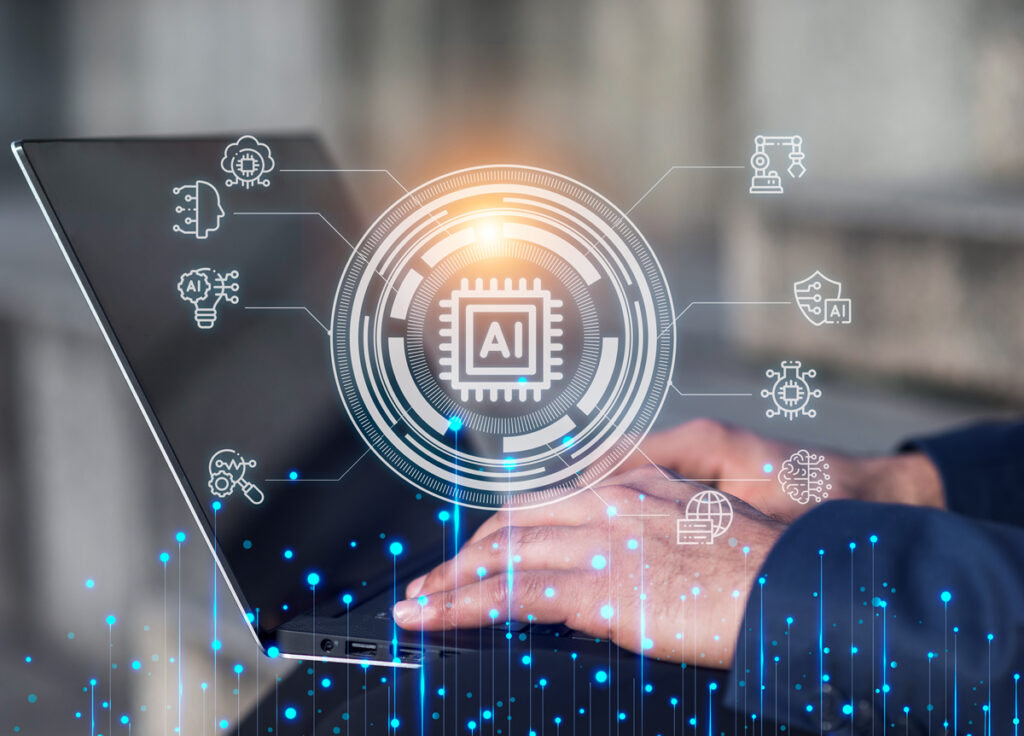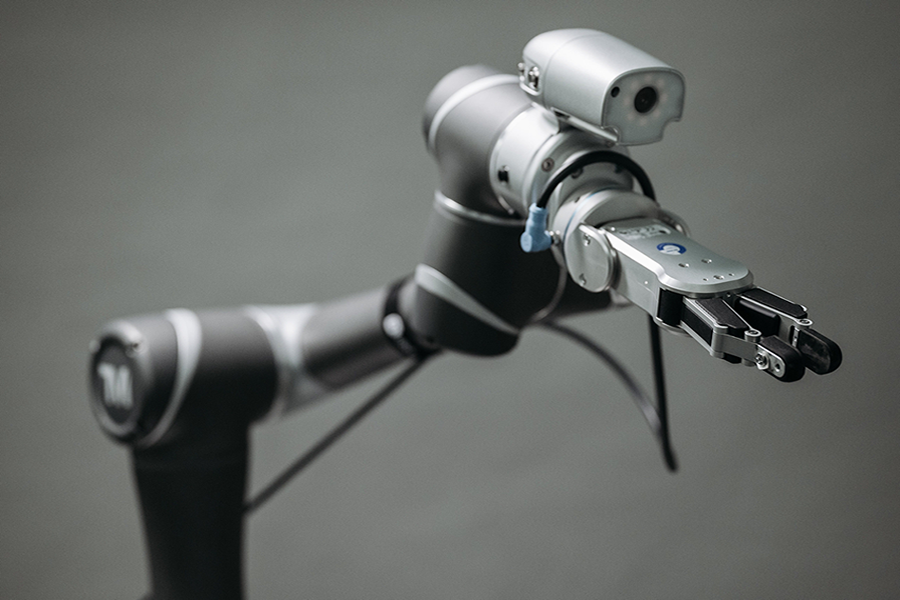Unlocking the Future: The Role of Artificial Intelligence in Programming In the dynamic realm of programming, Artificial Intelligence (AI) is emerging as a transformative force, reshaping the way developers approach coding challenges. As the demand for smarter and more efficient applications continues to rise, AI has become an indispensable ally for programmers seeking innovative solutions. In this blog post, we delve into the profound impact of Artificial Intelligence on programming, exploring how intelligent algorithms, machine learning, and automation are revolutionizing the development landscape.
Bridging Possibilities: Artificial Intelligence’s Crucial Role in Programming In the ever-evolving field of programming, Artificial Intelligence stands as a bridge between imagination and implementation, ushering in a new era of possibilities. This blog post unravels the intricate threads that weave together AI and programming, showcasing how machine intelligence enhances coding processes, optimizes efficiency, and fuels innovation. AI plays in empowering developers to overcome challenges and push the boundaries of what’s achievable in the coding landscape.
Revolutionizing Codecraft: The Impact of Artificial Intelligence in Programming Artificial Intelligence is not just a buzzword but a driving force reshaping the very fabric of programming. This blog post delves into the revolutionary impact of AI on codecraft, From automated code generation to predictive analytics, we dissect the multifaceted contributions of AI, shedding light on how it is propelling programming into a future where innovation knows no bounds. Join us as we unravel the layers of this technological evolution and examine the profound influence of Artificial Intelligence on the art and science of programming.
Table of Contents
Introduction
Defining Artificial Intelligence in Programming
Defining Artificial Intelligence in programming involves the application of advanced algorithms and computational models that enable machines to simulate human intelligence. Artificial Intelligence (AI) plays a pivotal role in enhancing search engine algorithms, refining user experience, and optimizing content visibility. AI algorithms analyze vast datasets to understand user intent, refine search results, and improve the relevance of content. Artificial Intelligence empowers programmers to create intelligent systems that adapt, learn, and evolve, ensuring websites are not only technically proficient but also attuned to the dynamic landscape of user preferences and search engine algorithms.
Significance of AI in the Coding Landscape
The significance of Artificial Intelligence (AI) in the coding landscape is transformative, ushering in an era where machines can comprehend, analyze, and generate code with unprecedented efficiency. AI’s ability to automate repetitive tasks, identify patterns, and optimize algorithms revolutionizes the way programmers approach coding challenges. With AI-powered tools, developers can streamline workflows, enhance productivity, and tackle complex problems with innovative solutions. The integration of AI in the coding process not only expedites development but also opens new frontiers for creativity and problem-solving.
Purpose and Scope of the Blog Post
The purpose of this blog post is to illuminate the profound impact of Artificial Intelligence (AI) on the field of programming, delving into its multifaceted roles and applications. With a focus on providing insights for both novice and experienced developers, the scope extends from understanding the fundamental concepts of AI in programming to exploring its advanced applications. We aim to dissect how AI contributes to code generation, machine learning integration, and the automation of routine tasks, reshaping the coding landscape. Additionally, this post will address challenges associated with the implementation of AI in programming, offering strategies for overcoming hurdles and ensuring responsible and ethical use of this transformative technology.
AI-Powered Code Generation
Understanding Automated Code Generation
Understanding automated code generation is at the forefront of the technological revolution, with Artificial Intelligence (AI) driving transformative changes in the way code is created. Automated code generation refers to the process where intelligent algorithms, a core component of AI, analyze patterns, data, and specifications to autonomously produce functional code. This innovative approach not only accelerates development timelines but also reduces the margin for error, as AI systems can quickly adapt to various programming paradigms and standards. Automated code generation represents a paradigm shift in programming, emphasizing efficiency and precision. Exploring this facet of AI in depth unveils its potential to reshape coding practices, fostering a future where developers can leverage intelligent systems to streamline their workflow and bring innovative solutions to fruition.

Examples of AI Tools Facilitating Code Writing
Examples of AI tools facilitating code writing showcase the transformative impact of Artificial Intelligence (AI) on the programming landscape. Cutting-edge tools like OpenAI’s GPT-3 (Generative Pre-trained Transformer 3) have gained prominence for their ability to generate coherent and contextually relevant code snippets based on natural language prompts. Another noteworthy example is GitHub Copilot, a collaboration between GitHub and OpenAI, which employs machine learning models to assist developers by suggesting entire lines or blocks of code as they write. These AI-driven tools leverage vast datasets, learning from diverse coding styles and patterns to provide developers with real-time suggestions, ultimately enhancing coding efficiency and fostering a collaborative environment. As we delve into these examples, it becomes evident that AI tools are not just streamlining the code-writing process but also reshaping the way developers conceptualize and implement solutions in the dynamic world of programming.
Benefits and Challenges of AI in Generating Code
The benefits and challenges of Artificial Intelligence (AI) in generating code reflect the dual nature of this transformative technology within the programming landscape. AI-driven code generation brings unparalleled efficiency, automating repetitive tasks, and significantly expediting the development process. Developers can leverage AI tools to streamline their workflow, improve productivity, and explore innovative solutions to complex coding challenges. However, challenges arise in areas such as ensuring the generated code aligns with best practices, handling corner cases, and addressing potential biases in the training data. Despite these challenges, the growing synergy between AI and code generation holds immense promise for the future of software development, offering a glimpse into a landscape where intelligent systems collaboratively augment human creativity and expertise.
Machine Learning in Programming
Integration of Machine Learning Algorithms
The integration of machine learning algorithms represents a pivotal stride in the realm of Artificial Intelligence (AI) and programming. By seamlessly incorporating machine learning into the coding process, developers can enhance their applications with intelligent features that adapt and evolve over time. Machine learning algorithms enable systems to recognize patterns, make predictions, and continuously learn from data, ushering in a new era of dynamic and responsive software. Whether applied to predictive analytics, natural language processing, or image recognition, the integration of machine learning algorithms empowers developers to create applications that not only automate tasks but also intelligently respond to changing environments.
Predictive Analytics and Decision-Making in Coding
Predictive analytics is revolutionizing decision-making in coding through the transformative capabilities of Artificial Intelligence (AI). By leveraging advanced algorithms and machine learning models, developers can harness the power of predictive analytics to anticipate potential challenges, optimize resource allocation, and make informed decisions throughout the software development lifecycle. Predictive analytics in coding involves analyzing historical data, identifying patterns, and extrapolating insights to foresee potential issues or bottlenecks. This proactive approach not only streamlines the coding process but also enhances the overall efficiency of project management. As developers increasingly embrace AI-powered predictive analytics, they gain a valuable tool for making data-driven decisions, mitigating risks, and ensuring the successful delivery of high-quality software solutions in an ever-evolving technological landscape.
Real-world Applications of Machine Learning in Software Development
In the realm of software development, real-world applications of machine learning, a subset of Artificial Intelligence (AI), have become instrumental in creating innovative and intelligent solutions. Machine learning finds diverse applications, from enhancing user experience to optimizing performance and security. Recommender systems leverage machine learning algorithms to personalize content suggestions, while anomaly detection algorithms identify irregularities in software behavior, fortifying security measures. Natural language processing (NLP) applications, powered by machine learning, enable software to understand and respond to human language, bridging the gap between technology and user communication.
Automation of Routine Tasks
Role of AI in Automating Repetitive Programming Tasks
The role of Artificial Intelligence (AI) in automating repetitive programming tasks is nothing short of revolutionary, freeing developers from the monotony of routine activities and unleashing new levels of efficiency. AI-driven automation excels in handling mundane and repetitive tasks, such as code generation, testing, and debugging. By deploying machine learning algorithms and intelligent systems, developers can automate workflows, allowing them to focus on more complex and creative aspects of software development. As AI continues to evolve, its role in automating repetitive programming tasks is reshaping the development landscape, empowering programmers to channel their expertise into more strategic and value-added activities.
Increased Efficiency and Time Savings
Artificial Intelligence (AI) plays a pivotal role in the realm of software development by bringing about increased efficiency and substantial time savings. Through the automation of repetitive tasks, intelligent algorithms and machine learning models enable developers to streamline their workflows and expedite the coding process. AI-powered tools, such as automated code generators and smart debugging systems, contribute to minimizing manual effort and reducing the time required for routine programming tasks. By harnessing the capabilities of AI, developers can focus their energy on more strategic and creative aspects of software design and innovation. The resulting efficiency gains not only accelerate development timelines but also enhance the overall productivity of software teams, ushering in a new era where time-saving technologies become integral to the coding landscape.

Impact on Developer Productivity
The impact of Artificial Intelligence (AI) on developer productivity is transformative, revolutionizing the way software is conceptualized, created, and optimized. AI tools and algorithms are tailored to augment developer capabilities, automating repetitive tasks, and providing intelligent insights that enhance decision-making. From automated code generation to smart debugging solutions, AI empowers developers to expedite their workflows, significantly reducing the time spent on routine programming tasks. The result is heightened productivity as developers can allocate more time and energy to creative problem-solving, innovation, and refining the user experience. By seamlessly integrating AI into the development process, developers can not only meet project timelines more efficiently but also raise the bar for the quality and sophistication of software solutions, marking a paradigm shift in the landscape of developer productivity.
Challenges and Solutions
Addressing Common Challenges in Implementing AI in Programming
Addressing common challenges in implementing Artificial Intelligence (AI) in programming is essential for harnessing the full potential of this transformative technology. One of the primary challenges lies in ensuring the ethical and responsible use of AI algorithms, considering issues such as bias, fairness, and transparency. Developers must grapple with the complexities of fine-tuning AI models to align with best practices and industry standards. Additionally, striking a balance between autonomy and human control remains a critical challenge, requiring careful consideration of the level of AI involvement in decision-making processes. Moreover, the need for comprehensive data sets for training AI models and handling potential biases within these datasets poses another hurdle. As the integration of AI in programming continues to evolve, addressing these challenges becomes paramount, paving the way for a future where intelligent systems coexist harmoniously with human developers, augmenting their capabilities and contributing to the advancement of the programming landscape.
Strategies for Overcoming Hurdles
Implementing successful strategies for overcoming hurdles in the integration of Artificial Intelligence (AI) into programming is crucial for maximizing the benefits of this transformative technology. First and foremost, establishing robust ethical guidelines and frameworks is essential to address concerns related to bias, fairness, and transparency in AI algorithms. Developers should prioritize continuous monitoring and auditing of AI models to ensure responsible and unbiased outcomes. Collaborative efforts between interdisciplinary teams, including ethicists and domain experts, can contribute to more holistic solutions. Moreover, fostering a culture of ongoing education and awareness within the development community helps address challenges associated with the dynamic nature of AI technologies. Open communication channels for sharing insights, lessons learned, and best practices play a vital role in shaping an environment where AI and human developers work synergistically to overcome hurdles, ensuring the responsible and effective integration of AI in programming practices.
Ensuring Ethical and Responsible AI Use in Development
Ensuring ethical and responsible Artificial Intelligence (AI) use in development is paramount as we navigate the complexities of integrating intelligent systems into the fabric of our technological landscape. Developers must adopt a proactive stance by prioritizing transparency, fairness, and accountability in AI algorithms. Establishing clear ethical guidelines and frameworks that align with societal values is crucial to mitigate potential biases and unforeseen consequences in AI applications. Regular audits, scrutiny, and open dialogues within the development community contribute to the continuous refinement of AI systems, fostering a culture of responsible innovation. Moreover, interdisciplinary collaboration involving ethicists, legal experts, and diverse stakeholders ensures a comprehensive approach to ethical AI development. As the impact of AI on society grows, the commitment to ethical and responsible AI practices becomes not only a developmental imperative but also a moral obligation, shaping a future where intelligent technologies serve humanity ethically and responsibly.
Conclusion
Recap of AI’s Impact on Programming
In recapitulating Artificial Intelligence’s (AI) impact on programming, it becomes evident that this revolutionary technology has reshaped the entire landscape of software development. From automated code generation to predictive analytics and machine learning integration, AI has emerged as a driving force behind increased efficiency, enhanced productivity, and innovative problem-solving in programming tasks. Its influence extends beyond mere automation, fostering a collaborative environment where developers and intelligent systems work in tandem. The integration of AI has not only expedited routine tasks but also elevated the quality of software solutions, pushing the boundaries of what’s achievable in the coding realm. As we reflect on AI’s transformative journey in programming, it is clear that its impact is far-reaching, propelling the industry into a future where the symbiotic relationship between human ingenuity and artificial intelligence continues to redefine the possibilities within the ever-evolving field of programming.
Looking Ahead: The Continued Evolution of AI in Development
Encouraging continued exploration and adoption of Artificial Intelligence (AI) in the field of development is pivotal for staying at the forefront of technological innovation. As AI continues to evolve, developers and organizations are urged to foster a culture of curiosity, experimentation, and continuous learning. Embracing workshops, training programs, and collaborative initiatives can empower developers to grasp the intricacies of AI technologies and integrate them seamlessly into their workflows. Furthermore, open discussions about challenges, ethical considerations, and success stories can contribute to a shared knowledge base within the development community. By promoting a mindset of adaptability and embracing the potential of AI, the development industry can unlock new possibilities, drive transformative advancements, and collectively shape a future where intelligent systems and human ingenuity converge to redefine the boundaries of innovation in the digital landscape.




14 Comments
The blend of slots and live dealer games on JLJL PH offers solid entertainment value, especially for math-minded players who enjoy analyzing odds and strategies.
Thrilled to see such insightful breakdowns on horse racing betting! For those looking for a trusted platform to manage their bets and winnings, Super PH offers secure deposits, a wide game selection, and fast withdrawals – a great complement to strategic betting.
Jilislot offers a smooth gaming experience with a great game variety. The interface is easy to navigate, and their slot titles like Money Coming really stand out. Definitely worth checking out! Jilislot hits all the right notes for casual and serious players alike.
I’ve used Best AI Tool to find great AI solutions quickly. It’s a handy resource for anyone looking to boost productivity without the hassle of endless searching.
Super Ace by Jili Games delivers thrilling gameplay with its 1024 ways to win and free spins feature. It’s no wonder it’s a hit in the Philippines. Check out Super Ace Jili for more details!
It’s fascinating how data trends can shape lottery strategies. Tools like AI Tools show how smart curation can simplify complex decisions-maybe AI could one day decode those elusive number patterns!
Great piece-security and creativity both need smart tools. For design teams, AI like Lovart AI Agent can streamline workflows while keeping concepts sharp and secure.
Sprunki Incredibox truly elevates the music-mixing experience with its fresh beats and visuals. It’s a creative must-try! Check out the mod here.
Dice games always bring a thrill with their unpredictable outcomes, but platforms like Jili777 Login take it further by blending strategy and AI for a smarter play. Definitely worth checking out!
The evolution of musical collaboration: Spunky Sprunki enables global artists to co-create through its sharing ecosystem.
🎧 Binaural brilliance: Sprunki InCrediBox now supports 3D audio head-tracking for immersive mixes!
Where digital art meets audio engineering: Sprunki Game creates immersive experiences through synchronized visual and musical feedback loops.
This post is groundbreaking! Speaking of innovation, Sprunki breaks new ground.
Masterful technology! Hailuo AI KungFu creates joy through AI-powered video generation.